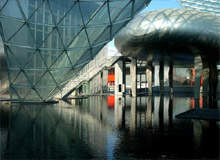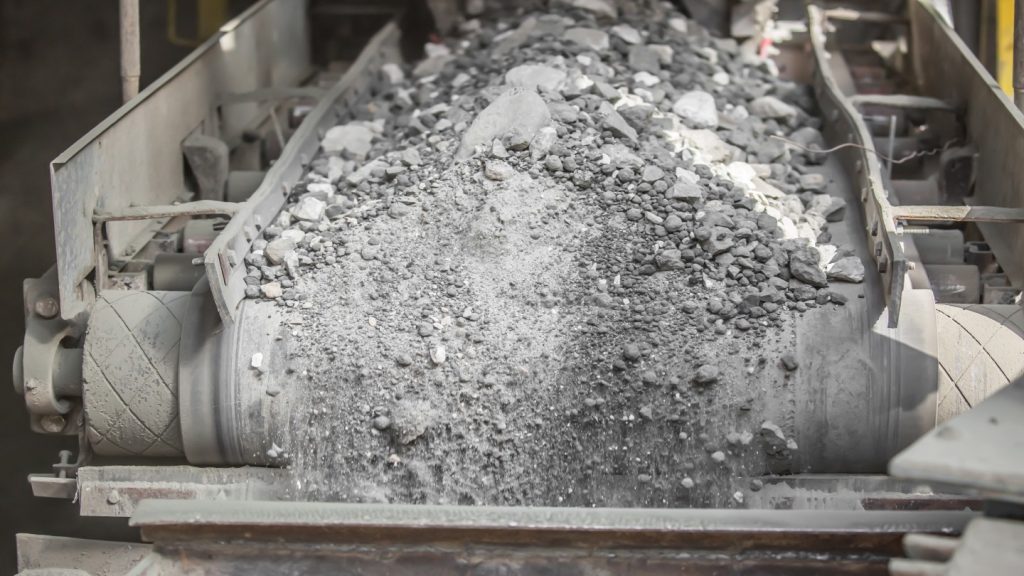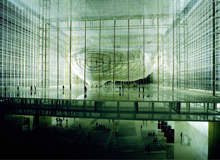
His biography’s first line states he was born in Rome, but is of Lithuanian descent. One of the most distinctive, if unpredictable, architects in the world, never mind Italy, is still proud of his links to a tiny Baltic state.
For Massimiliano Fuksas it is more a badge of honour that proves he is a global citizen rather than parochial nationalist. One grandmother was German, his father Lithuanian and mother Roman.
“It is useful because you have no complex with anybody,” he explains. “You feel everybody is like a brother, so we can have a conversation and collaborate. I don’t see good or bad in people.”
THE ACCIDENTAL ARCHITECT
Fuksas originally trained as an artist and came to architecture almost by accident.
See Also:
“I started as a painter and thought I could be a film maker, but I thought I would give architecture a go. I think an architect is always a creator and an artist, though the technique is less important than the inspiration.”
How well do you really know your competitors?
Access the most comprehensive Company Profiles on the market, powered by GlobalData. Save hours of research. Gain competitive edge.

Thank you!
Your download email will arrive shortly
Not ready to buy yet? Download a free sample
We are confident about the unique quality of our Company Profiles. However, we want you to make the most beneficial decision for your business, so we offer a free sample that you can download by submitting the below form
By GlobalDataLike an artist, Fuksas seeks ideas from all manner of sources around him.
“I never look for inspiration in architecture, I look at art, movies and landscapes, like dunes or forests.”
Although playful in his views, Fuksas boasts strongly held beliefs. Not least of which is the fact we are should look beyond architectural theories. He is seen as a cutting-edge designer for such high-profile projects as the congress centre in his home city, but Fuksas is wary of innovation.
“The best innovation is to give people a place to live that is appropriate for their lives. We need to understand better men, women and children. Democracy is the real innovation in architecture today.”
DEMOCRATIC DESIGN
For Fuksas, democracy means less locally elected representatives, but more being open to the views and aspirations of ordinary people.
“You only realise what democracy is when you don’t have it, like when you lose freedom. When you see the destruction of the golden dome of Samara or the Buddhas in Afghanistan, you feel that you have lost something. Architecture is part of the
community.”
“I always seek to create a stage for the players, the people. I don’t want to impose anything or decide how people should move.”
SOLVING PROBLEMS WITH INTUITION
Fuksas is concerned that architects are too keen to find a technical solution to solve a design problem rather than looking at the needs of users of a building. He is even more disparaging about architectural theories.
“We have reached the end of the idea that we can find a solution with knowledge of science. Today we should use more intuition than intelligence. I don’t believe in theory or even pragmatism, only emotion and inspiration; the quality you can give to
the feeling of a vision.”
“All theories have been found to be false, none were good. They were good for a period, but not for eternity.”
Just as the stage is a platform for actors to express emotions, feeling is at the centre of Fuksas’s work.
“If you want to give emotion to other people, you have to be surprised every day. If you go one day without surprise, you cannot have emotion. Then you try and compose two contrasting elements, so that in the same moment you have minimalism and expressionism, conceptualism and impressionism.”
“What I like is the conflict between opposites. That helps me find emotion.”
FERRARI HEADQUARTERS AND THE MILAN TRADE FAIR
One example of this conflict would be the Ferrari headquarters in Maranello, Italy.
Here, you have a labyrinth on the outside with its water and trees, compared to the sleek, straightforward interior. Fuksas also cites his Milan trade fair complex, where simple geometries of the glazed street look out on the rolling hills of the surrounding landscape.
This Milan project is based in the city’s suburbs, an area to which Fuksas attaches huge importance. In fact, the outskirts of metropolitan areas have become a specialism of his practice, both in terms of actual designs and studies on how they should be designed.
“The real city today is the suburbs,” he states. “The central city is like the suburbs used to be because now it is like Disney. The suburbs are more complex, because there is infrastructure, housing and work places.”
“Nobody has taken care of the question of megastructure. Everyone works in small, nice architecture, but no one takes care of what the word means. First, we need to analyse communities and how they live and move.”
“The biggest challenge is how to deal with a world of six billion people, many of whom are moving every day from rural areas to cities. My answer is we have to work with chaos, rather than order. I call this sublime chaos.”
Despite such idiosyncratic views, Fuksas sets great store by meeting deadlines.
“We have to be fast, because you always need fresh concepts and not ideas that quickly become boring.”
LESS AESTHETICS, MORE ETHICS
This came out in 2000 when Fuksas arranged the architectural section of the Venice Biennale under the slogan ‘Less Aesthetics, More Ethics’. Incidentally, the city’s next biannual arts festival focuses on his urban interests with the title ‘Megalopolis’.
“I am much more radical now. The world is becoming worse than I realised. I thought it was dangerous, but not so much. There are too many egoists, so no possibility of understanding between two different people or cultures.”
This is something Fuksas is working hard to achieve, with his latest project taking him to Africa.
AFRICAN INSTITUTE OF SCIENCE AND TECHNOLOGY
Massimiliano Fuksas Architects has most recently won a commission for the campus for the African Institute of Science and Technology, to be based in Abuja, the capital of Nigeria since 1991. As ever, the architect is keen to promote interesting design by steering his staff away from drawing plans too early.
“First comes the concept, which you can make on paper or as a model, so then you can show it as a picture. Never make a plane at the start, because you can’t make a plane from a concept, or a concept from the plane.”
For someone that professes to despise theories, Fuksas can sound pretty dogmatic at times. Only when you hear him speak do you realise that he twists language in the same way his designs play with preconceived notions of what, say, a conference centre or office block should look like.
All you can rely on with this visionary is that it will look totally unexpected.





